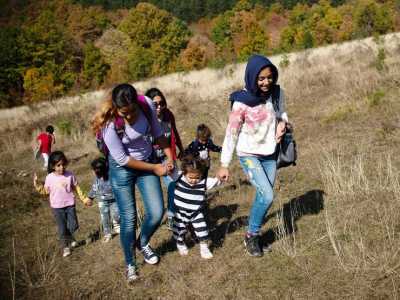
By Tanya Murphy and Jacob Warn, external Learning Coordinators, Across Borders
For civil society organisations (CSOs), the challenges of working with people seeking asylum in the era of Covid-19 have been strongly felt. In a series of blog posts, Comic Relief discusses the power of collective learning in helping CSOs to adapt and provide mutual support during the Covid-19 crisis. Here, we look at learning and reflections from the refugee and migration sector.
Comic Relief is funding 19 organisations and partnerships through its programme Across Borders: Routes to Safety for Refugees. This cohort is providing direct support to people on the move through grassroots approaches, developing arts-based advocacy projects and large-scale cross-border interventions.
These organisations are familiar with responding in uncertain times to unfolding emergencies and we have been keen to discuss their insights and learnings from Covid-19. In a webinar last month, these CSOs shared their challenges and stories of remarkable adaptation.
Here are our three key takeaways:
1. THE SHOW MUST GO ON
Choosing contingency over cancellation
In the face of a massive global pandemic, it would be easy to simply freeze. But when working on the front-line in support of refugees, hitting pause risks lives. As Covid-19 shut down public services, these organisations were busy finding alternatives.
In some of the most urgent contexts, CSOs such as European Lawyers in Lesvos immediately moved to conduct consultations via phone and online, continuing their commitment to upholding basic rights and reaching communities in need.
For those stuck at home, education providers including St Andrews Refugee Service kept teaching and maintained personal relationships for those experiencing isolation, albeit remotely. The Govan Community Project set up a device lending scheme and Good Chance Theatre paid for mobile data costs to reduce the barriers to connectivity.
For some, Covid-19 posed a significant threat to the funding of core costs and salaries. In response, organisations such as Counterpoint Arts committed to supporting(opens in new window) their artists and staff. In a similar way, The Fund for Global Human Rights made it clear(opens in new window) that their grantees should repurpose funds to make sure staff and beneficiaries could stay safe during this period, highlighting their dynamic and flexible approach openly.
2. TOGETHER WE ARE STRONG
Leveraging communities of support
Despite the seeming barriers of lockdown, many CSOs took on the challenge to deepen their collaborations with partners and communities through alternative means. The Helen Bamber Foundation committed to building ‘collaborative, multi-agency teams’, ensuring their clients had access to all necessary support. Boaz Trust drew on its supporter base to successfully crowdfund(opens in new window) for the installation of internet connections for destitute beneficiaries living in their accommodation facilities. Family for Every Child fundraised(opens in new window) to help cover basic food and medicine costs and Help Refugees disbursed emergency funds to their grassroots partners.
Refugee Action took the same approach, recognising that ‘now more than ever, it’s critical we work together on our common challenges’. With their partners, they shared learnings and urgent information around Covid-19, launching an entirely new handbook(opens in new window) for those seeking asylum. In a similar show of community action, the European Network on Statelessness consulted over 150 CSOs, (opens in new window)collecting their experiences(opens in new window) of Covid-19 to produce position papers and host webinars. Stop the Traffik meanwhile launched three(opens in new window) new campaigns(opens in new window) to reflect the changes to human trafficking brought about by Covid-19.
3. A MOMENT TO REFLECT
Learning in lockdown
The enforced ‘pause’ that life under lockdown sometimes caused also gave organisations a chance to reflect on core values. For IMIX, who are committed to changing the conversation on migration, the pandemic shone a light on the importance of resilience and adapting to the seemingly impossible. Organisations such as Refugee Trauma Initiative challenged their existing assumptions and felt the freedom to test new models of working whilst in lockdown.
For others, such as Medical Justice and the Refugee Youth Service, Covid-19 created space for some of the important questions, such as who should be doing what and where, and to what extent should we go back to doing things the way we were doing them before lockdown?
As society emerges from lockdown, CSOs around the world are asking themselves similar questions as they translate recent learnings for the future. But one thing is clear: this cohort of CSOs is trying to respond with flexibility, cooperation and dynamism in very difficult circumstances. As long and challenging lockdowns are gradually eased internationally, we are committed to bringing together the expertise and experience of CSOs across the refugee route, to build a stronger foundation of support for people on the move.


